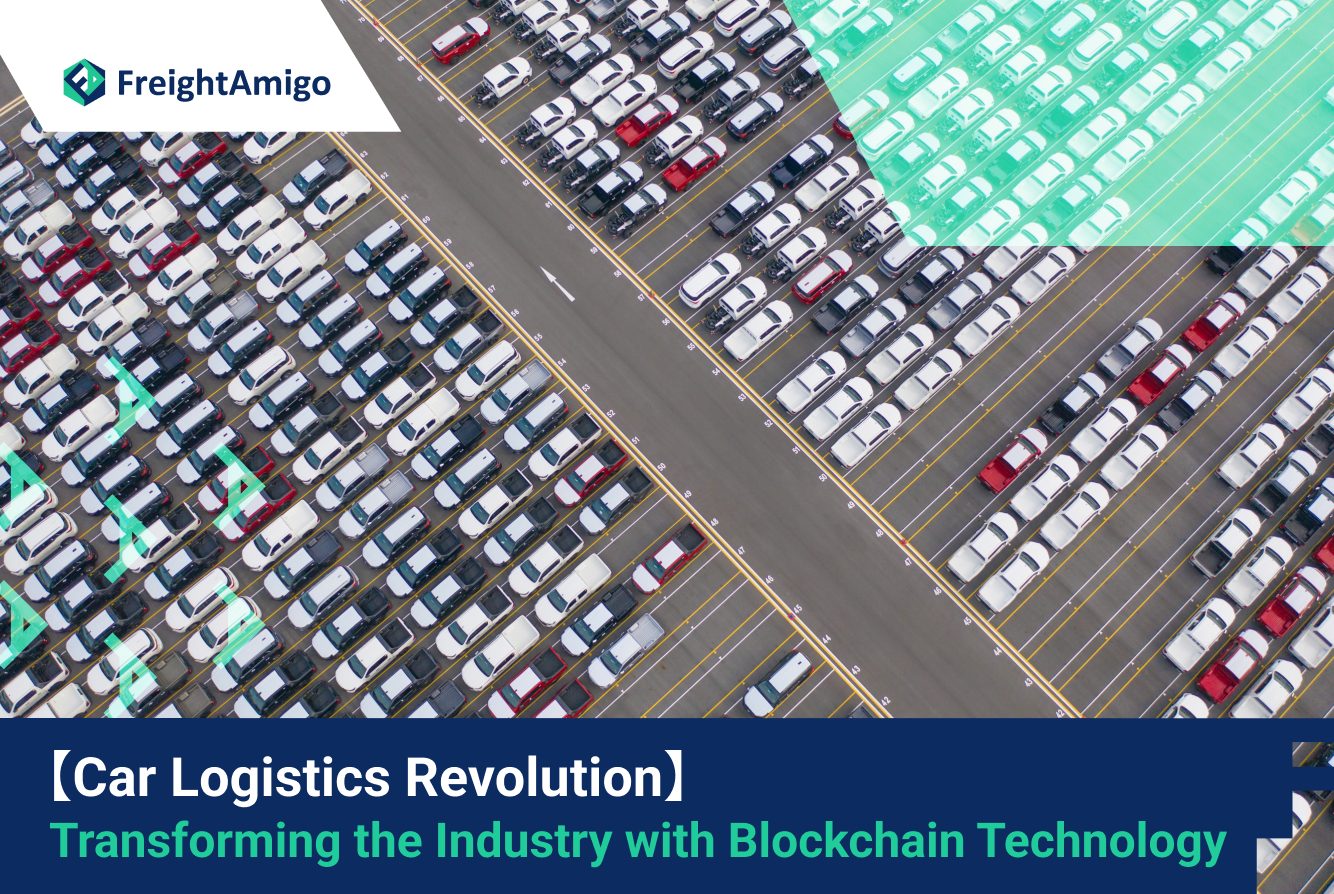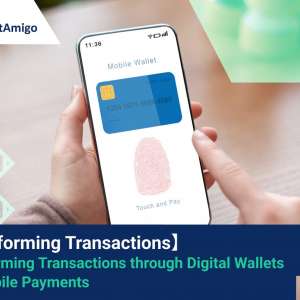In today’s fast-paced world, the automotive industry is constantly evolving and seeking innovative solutions to streamline operations and enhance customer experience. One technology that has gained significant attention in recent years is blockchain. With its decentralized and transparent nature, blockchain has the potential to revolutionize car logistics, improving efficiency, security, and trust throughout the supply chain. In this article, we will explore the transformative power of blockchain in car logistics, examining its benefits, use cases, and challenges.
Author Name:Tiffany Lee – Marketing Analyst at FreightAmigo
Want To Compare The Best Express, Air Freight, Sea Freight, Rail Freight & Trucking Rates So As To Have Better Control On Cost?
Understanding Blockchain Technology
Before delving into the applications of blockchain in car logistics, it is crucial to understand the fundamentals of this revolutionary technology. In its simplest form, blockchain is a decentralized digital ledger that records transactions across multiple computers. Unlike traditional databases, blockchain is immutable, meaning once a transaction is recorded, it cannot be altered or tampered with. This feature ensures transparency and trust among network participants.
Key Features of Blockchain
- Immutability: Transactions recorded on the blockchain cannot be modified or deleted.
- Transparency: All transactions are visible to network participants, promoting trust and accountability.
- Decentralization: Blockchain operates on a peer-to-peer network, eliminating the need for intermediaries.
- Security: Blockchain utilizes advanced cryptographic techniques to secure transactions and protect sensitive data.
- Speed and Efficiency: Transactions on the blockchain can be processed faster than traditional systems, reducing delays and improving overall efficiency.
Revolutionizing Car Sales and Leasing
The car sales and leasing process is often plagued by challenges such as information asymmetry, fraud, and lack of transparency. Blockchain technology can address these issues, revolutionizing the way vehicles are bought and sold.
Enhanced Transparency and Trust
One of the primary benefits of blockchain in car sales and leasing is enhanced transparency. By recording vehicle information, such as mileage, accidents, and repair history, on the blockchain, potential buyers can verify the accuracy of the information provided by sellers. This eliminates the risk of odometer fraud and empowers customers to make informed purchasing decisions.
Simplified Payment Processes
Blockchain-based smart contracts can automate payment processes, simplifying the car sales and leasing experience. Smart contracts are self-executing agreements that automatically trigger actions when predefined conditions are met. For example, a smart contract can facilitate the transfer of ownership and funds once a buyer and seller agree on the terms of the transaction. This eliminates the need for intermediaries and speeds up the overall process.
Real-World Application: DocuSign and Visa Partnership
In 2015, DocuSign and Visa partnered to develop a blockchain-based proof-of-concept project for car leasing. This project aimed to simplify the leasing process by leveraging blockchain technology. Through the use of smart contracts, customers could choose their desired car, sign a lease agreement, and drive off, all within a secure and transparent blockchain ecosystem.
Combating Counterfeit Car Parts
Counterfeit car parts pose a significant threat to the automotive industry, compromising safety, reliability, and profitability. Blockchain technology offers a promising solution to combat this issue by ensuring the authenticity and provenance of auto spare parts.
Securing the Supply Chain
By utilizing unique identification tags, such as radio-frequency identification (RFID) tags, car manufacturers can track the movement of spare parts throughout the supply chain. These tags can be linked to a blockchain, creating an immutable record of each part’s journey. This ensures that counterfeit parts can be easily identified and eliminated from the supply chain, safeguarding both manufacturers and customers.
Preventing Fraud and Enhancing Safety
Counterfeit car parts, especially critical components like airbags, can jeopardize the safety of drivers and passengers. By integrating blockchain technology, manufacturers can establish a secure and transparent system to verify the authenticity of each part. This helps prevent fraud, reduces the risk of accidents caused by faulty components, and enhances overall safety on the road.
Real-World Application: Nissan’s Battle Against Counterfeit Parts
Nissan, one of the world’s leading car manufacturers, has been actively combating counterfeit car parts in the Middle East. The company estimates an annual loss of approximately $60 million due to counterfeit parts in the Arab Emirates alone. By leveraging blockchain technology, Nissan aims to prove the provenance of its auto spare parts, reducing financial losses and ensuring customer safety.
Reinventing Auto Insurance
The insurance industry plays a crucial role in the automotive ecosystem, providing coverage for vehicles and mitigating financial risks. Blockchain technology can transform the insurance sector by improving fraud detection, streamlining claims processing, and enhancing customer experience.
Enhancing Fraud Detection
Fraudulent insurance claims are a significant challenge for insurance providers, leading to financial losses and increased premiums for honest policyholders. Blockchain-based smart contracts can automate the claims process and validate the authenticity of submitted information. By cross-referencing data from various sources, such as repair records and vehicle maintenance history stored on the blockchain, insurers can detect fraudulent claims more effectively.
Streamlining Claims Processing
Processing insurance claims often involves numerous intermediaries, paperwork, and delays. By leveraging blockchain technology, insurers can streamline the claims process, reducing paperwork and administrative overhead. Smart contracts can automate claim settlement, ensuring faster and more accurate payouts to policyholders.
Real-World Application: Toyota’s Collaboration for Blockchain Insurance Solutions
Toyota, a renowned automotive manufacturer, has partnered with technology companies such as MIT, BigchainDB, and Oaken Innovations to explore blockchain-based applications for insurance purposes. Toyota aims to leverage blockchain technology to create usage-based insurance solutions, improving the accuracy of risk assessment and providing personalized coverage options to customers.
Revolutionizing Cargo Shipping
Efficient cargo shipping is vital to the automotive industry, ensuring the timely delivery of vehicles and spare parts worldwide. Blockchain technology can optimize supply chain processes, enhancing transparency, security, and efficiency in cargo shipping.
Enhancing Supply Chain Visibility
The traditional shipping industry relies on complex communication networks involving multiple stakeholders, which can lead to delays, errors, and lack of transparency. By implementing blockchain technology, shipping companies can create a secure and transparent system where all relevant information, such as shipment status, ownership, and location, is stored on the blockchain. This allows stakeholders to track and verify the movement of cargo in real-time, reducing delays and improving overall efficiency.
Preventing Fraud and Improving Security
Fraudulent activities, such as cargo theft and tampering, pose significant risks to the shipping industry. Blockchain technology can prevent fraud by creating an immutable record of each transaction and shipment event. This ensures that only authorized parties can access and modify the information, enhancing security and trust throughout the supply chain.
Real-World Application: Maersk and IBM Collaboration
Maersk, a global leader in cargo shipping, has partnered with IBM to leverage blockchain technology for supply chain management. Through the use of blockchain-based smart contracts, Maersk has streamlined paperwork, reduced administrative overhead, and improved transparency in its supply chain. This collaboration has demonstrated the potential of blockchain to revolutionize cargo shipping and logistics.
Accelerating Self-Driving Development
Self-driving cars are the future of the automotive industry, promising safer roads, enhanced mobility, and increased efficiency. Blockchain technology can accelerate the development of self-driving cars by facilitating data sharing, collaboration, and innovation.
Data Collection and Collaboration
Developing self-driving cars requires extensive data collection and analysis. Blockchain technology can enable secure and efficient data sharing among vehicle manufacturers, researchers, and other stakeholders. By securely sharing data on the blockchain, car manufacturers can gather valuable insights, improve their autonomous driving algorithms, and bring self-driving cars to the market faster.
Real-World Application: Toyota Research Institute’s Perspective
The Toyota Research Institute recognizes the potential of blockchain technology in expediting the development of autonomous vehicles. By leveraging distributed ledgers and blockchains, the institute believes that necessary data transfer between vehicle owners, researchers, and manufacturers can be facilitated. This collaboration will accelerate the production of fully autonomous electric vehicles.
Conclusion
As the automotive industry continues to evolve, embracing innovative technologies is crucial for sustained growth and competitiveness. Blockchain technology offers immense potential to revolutionize car logistics, enhancing transparency, security, and efficiency throughout the supply chain. From car sales and leasing to combating counterfeit car parts, from reinventing auto insurance to optimizing cargo shipping, blockchain can transform numerous aspects of the automotive ecosystem. While challenges such as data privacy, code quality, and subcontractor engagement need to be addressed, the benefits of blockchain in car logistics are undeniable. By embracing this groundbreaking technology, the automotive industry can pave the way for a future of seamless, secure, and customer-centric experiences.
There Are Different Options For Cargo Transportation. If You Want To Choose The Most Convenient And Suitable Solution, It Is Best To Have The Full Support Of Logistics Experts! If You Are Planning To Ship Goods Overseas, Please Go To The FreightAmigo Page For Inquiries.
===
Read More:
【Blockchain Technology】A Game Changer for Transparent and Secure Financial Transactions in Logistics
【Financial Technology】Blockchain Revolutionizing the Logistics Industry with Smart Contracts
【Streamlining Supply Chains】The Power of Blockchain in Logistics
===
If you have any inquiries on logistics/supply chain, feel free to contact FreightAmigo now:
Chat with us online OR
Phone : +852 28121686
WhatsApp: +852 27467829









































